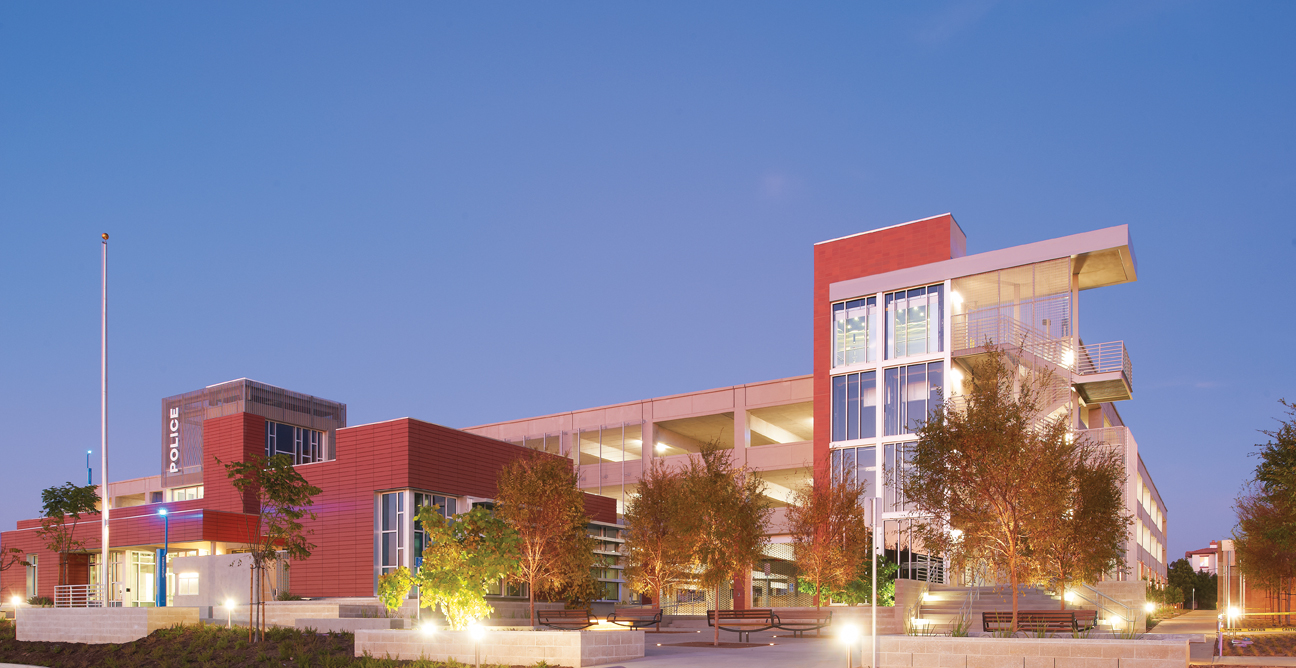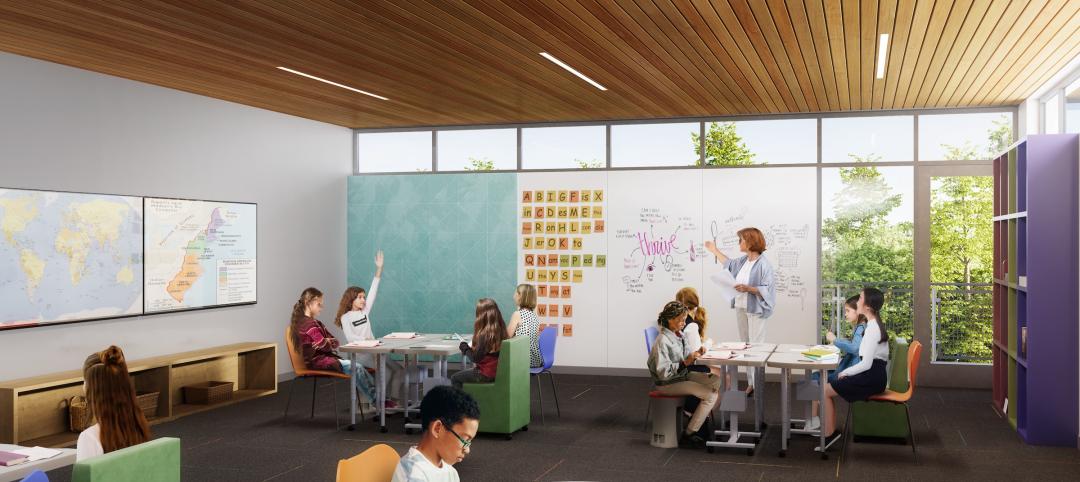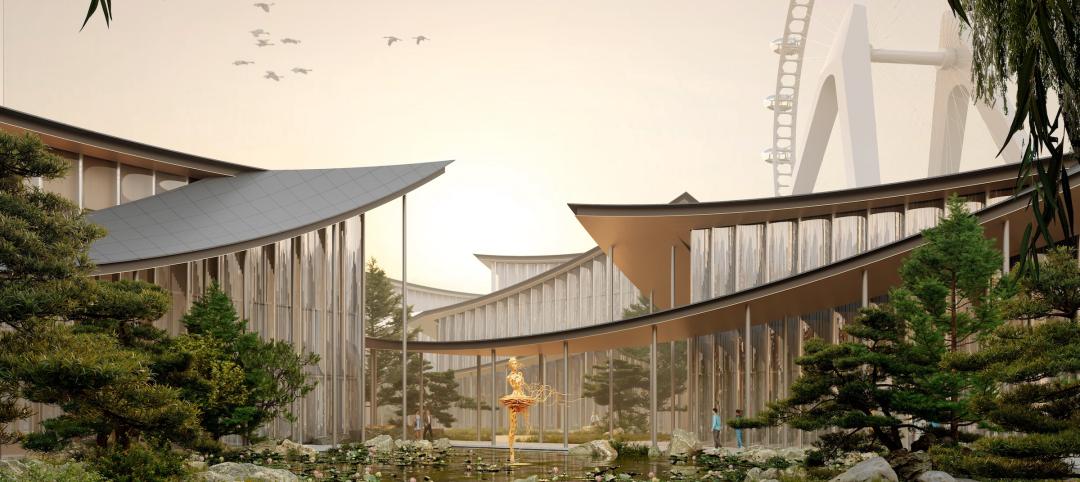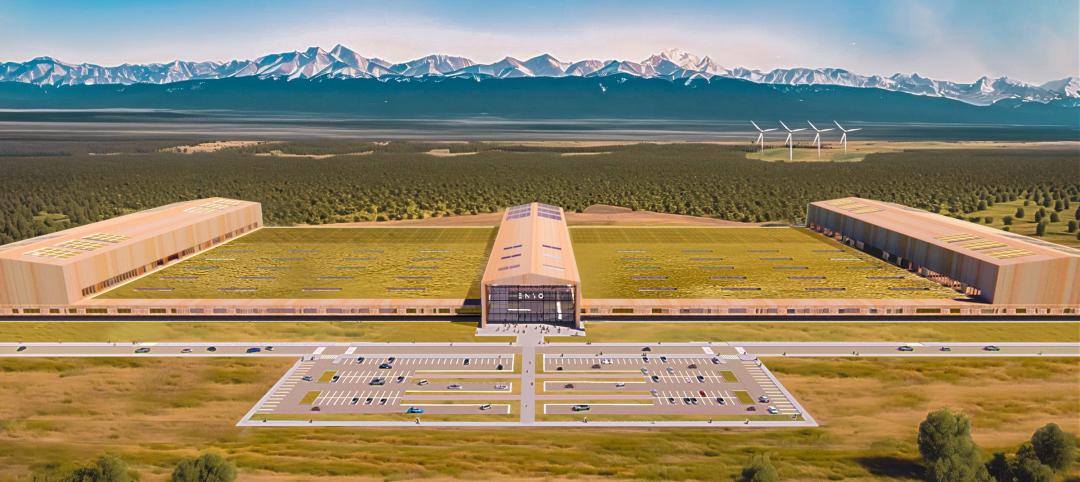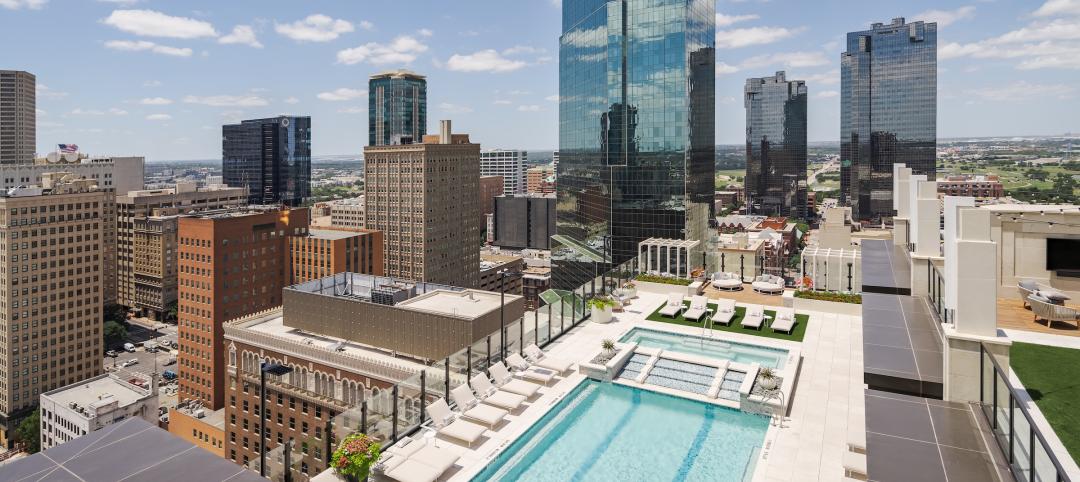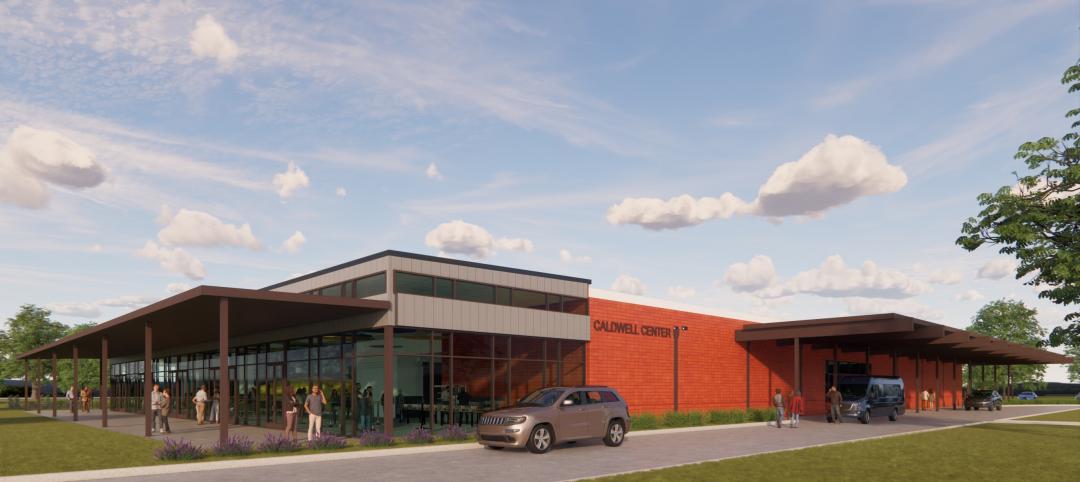Colleges and universities are among the most active players in the green building game, to the point where LEED Gold and even LEED Platinum are becoming de rigueur on campus. Recently, several academic institutions have moved to the head of the class with net-zero energy projects.
Take the new campus police substation at San Diego Miramar College, designed by Harley Ellis Devereaux. The 5,108-sf facility earned LEED Platinum and has been designed to net-zero energy readiness. That promise will be fulfilled when PVs are added to the adjacent four-story, 828-space parking garage (by International Parking Design. McCarthy Building Cos. was the GC on the entire $17.9 million complex.
A solar chimney in the substation tower creates an airflow that pulls cool ocean air through the interior. The HVAC system automatically shuts down when the operable windows are open. A terra cotta greenscreen and vegetated roof shield the building from solar heat gain.
At Georgia Tech, HDR Architecture and CUH2A teamed up with Gilbane Building Co. on the recently opened Carbon-Neutral Energy Solutions Laboratory. The $23 million facility is devoted to research in energy-conversion technologies, such as biomass gasification kinetics, high-efficiency combustion engines, biochemical-enzymatic conversion of biomass materials, and greenhouse gas capture from power plants.
The Building Team collaborated with Georgia Tech researchers to evaluate initial costs, life cycle costs, and carbon savings for numerous energy-saving options. Net-zero energy strategies include translucent wall panels to maximize daylight, operable windows, radiant heat, underfloor air distribution, and chilled beams. On the south façade, the glazing is shaded with an awning clad in PV panels; PVs were also installed on the roof and nearby on the site.
Meanwhile, LEED Platinum medallions keep piling up at universities. As controls subcontractor to Anderson Construction (GC), CH2M Hill aided in the design of Oregon State University’s Energy Center, the first power facility in the U.S. to win a Platinum rating. The 25,000-sf, 6.5MW co-generation plant is expected to reduce the university’s energy costs $650,000 a year and cut carbon emissions by 38% compared to the plant it replaced.
In the Chicago suburb of Palos Hills, Ill., Legat Architects completed Moraine Valley Community College’s Southwest Education Center, a slender, stand-alone off-campus facility that relies on a self-shading curtain wall to control heat buildup in summer. The HVAC system uses a geothermal system, with 36 geothermal wells, each 320 feet deep, and heat pumps to reduce energy consumption by 45% over a conventional design. It, too, has achieved LEED Platinum status.
LEED Platinum was recently earned by the Centre of Construction Excellence at Algonquin College, Ottawa, Ont. The $79 million, 200,000-sf research facility achieved a 60% reduction in energy consumption against the Model National Energy Code of Canada.
The Building Team included design firms Diamond Schmitt Architects and Edward J. Cuhaci and Associates Architects; Halsall (SE, green building consultant); and EllisDon Corporation (design-build contractor).
LEED Gold projects are also dotting the academic landscape. In Selden, N.Y., BBS Architects, Landscape Architects and Engineers (architect, interior designer, MEP), Tsoi/Kobus & Associates (lab designer), and Ysrael A. Seinuk (SE) designed the 68,500-sf Life Sciences Building at Suffolk County Community College for 1,500 students. Kiosks and interactive boards display real-time data on the building’s power and HVAC system performance.
In Massachusetts, Consigli Construction worked with the design team of Pfeufer Richardson Architects, Einhorn Yaffee Prescott, and Richard Burck Associates Landscape Architects to complete a 410-bed residence hall at Framingham State University. Ultra-high efficiency boilers, geothermal heat pumps, and a 20,000-gallon rainwater storage system helped gild the building.
At Tarrant County College’s Southeast Campus, in Arlington, Texas, SHW Group led the design of the 114,519-sf Science and Academic Building, specifying super-insulated walls and a highly efficient energy recovery mechanical system to trim energy use 21% below code.
The true measure of any green building, however, is how well it performs over time. The Multi-Use Building at City College of San Francisco, which went online in 2010, proved itself worthy of its LEED Gold designation by using 40% less energy than a building designed to code; this, despite record high temperatures in the summer of 2011 and record cold temps last December.
The Building Team of Interface Engineering (MEP), Pfau Long Architecture (design architect), VBN Architects (executive architect), and Lend Lease (GC) completed the 102,000-sf academic facility. +
Related Stories
K-12 Schools | Aug 29, 2024
Designing for dyslexia: How architecture can address neurodiversity in K-12 schools
Architects play a critical role in designing school environments that support students with learning differences, particularly dyslexia, by enhancing social and emotional competence and physical comfort. Effective design principles not only benefit students with dyslexia but also improve the learning experience for all students and faculty. This article explores how key design strategies at the campus, classroom, and individual levels can foster confidence, comfort, and resilience, thereby optimizing educational outcomes for students with dyslexia and other learning differences.
Museums | Aug 29, 2024
Bjarke Ingels' Suzhou Museum of Contemporary Art conceived as village of 12 pavilions
The 60,000-sm Suzhou Museum of Contemporary Art in Suzhou, Jiangsu, China recently topped out. Designed by Bjarke Ingels Group (BIG), the museum is conceived as a village of 12 pavilions, offering a modern interpretation of the elements that have defined the city’s urbanism, architecture, and landscape for centuries.
Adaptive Reuse | Aug 28, 2024
Cities in Washington State will offer tax breaks for office-to-residential conversions
A law passed earlier this year by the Washington State Legislature allows developers to defer sales and use taxes if they convert existing structures, including office buildings, into affordable housing.
Industrial Facilities | Aug 28, 2024
UK-based tire company plans to build the first carbon-neutral tire factory in the U.S.
ENSO, a U.K.-based company that makes tires for electric vehicles, has announced plans to build the first carbon-neutral tire factory in the U.S. The $500 million ENSO technology campus will be powered entirely by renewable energy. The first-of-its-kind tire factory aims to be carbon neutral without purchased offsets, using carbon-neutral raw materials and building materials.
Architects | Aug 28, 2024
KTGY acquires residential high-rise specialist GDA Architects
KTGY, an award-winning design firm focused on architecture, interior design, branded environments and urban design, announced that it has acquired GDA Architects, a Dallas-based architectural firm specializing in high rise residential, hospitality and industrial design.
K-12 Schools | Aug 26, 2024
Windows in K-12 classrooms provide opportunities, not distractions
On a knee-jerk level, a window seems like a built-in distraction, guaranteed to promote wandering minds in any classroom or workspace. Yet, a steady stream of studies has found the opposite to be true.
Building Technology | Aug 23, 2024
Top-down construction: Streamlining the building process | BD+C
Learn why top-down construction is becoming popular again for urban projects and how it can benefit your construction process in this comprehensive blog.
Airports | Aug 22, 2024
Portland opens $2 billion mass timber expansion and renovation to its international airport
This month, the Portland International Airport (PDX) main terminal expansion opened to passengers. Designed by ZGF for the Port of Portland, the 1 million-sf project doubles the capacity of PDX and enables the airport to welcome 35 million passengers per year by 2045.
Adaptive Reuse | Aug 22, 2024
6 key fire and life safety considerations for office-to-residential conversions
Office-to-residential conversions may be fraught with fire and life safety challenges, from egress requirements to fire protection system gaps. Here are six important considerations to consider.
Resiliency | Aug 22, 2024
Austin area evacuation center will double as events venue
A new 45,000 sf FEMA-operated evacuation shelter in the Greater Austin metropolitan area will begin construction this fall. The center will be available to house people in the event of a disaster such as a major hurricane and double as an events venue when not needed for emergency shelter.


